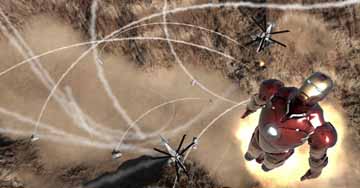Canadian Mennonite
Volume 12, No. 12
June 9, 2008
Film Review
Ironic, Man
Iron Man.
Directed by Jon Favreau. Starring Robert Downey Jr., Gwyneth Paltrow and Jeff Bridges.
A Paramount Pictures/Marvel Entertainment release, 2008. Rated PG.
 |
Part way through Iron Man, this spring’s first big hit movie, Obadiah Stane reminds Tony Stark that Stark Industries built its innovative energy device, called the “Arc Reactor,” as an instrument of peace designed by a company that specializes in designing and manufacturing the world’s most advanced and deadly weapons. The fact that the Arc Reactor itself becomes an instrument of death is therefore “pretty ironic, man.” But even more ironic is how the filmmakers fill their film with irony and yet don’t seem to realize it themselves.
Iron Man is full of clever writing and wry humour, with many wonderful lines superbly delivered by its two central actors, Robert Downey Jr. (who plays Tony Stark to perfection) and Jeff Bridges (great as “baddie” Obadiah Stane).
Before his “conversion” experience in a cave in Afghanistan, Tony Stark is naively casual about his role as a weapons designer, saying things like, “My old man had a philosophy: ‘Peace means having a bigger stick than the other guy,’” to which a journalist responds, “A lot of people would call that war-profiteering.” Stark’s answer: “I guarantee you the day weapons are no longer needed to keep the peace, I’ll start making bricks and beams for baby hospitals.”
This is good stuff, and it continues when Stark returns from captivity in Afghanistan as a new man. “I saw young Americans killed by the very weapons I created to defend them and protect them,” he admits. “And I saw that I had become part of a system that is comfortable with zero-accountability . . . so, effective immediately, I am shutting down our weapons program.”
Wow! And when Stane reacts to this news by saying, “Your father, he helped give us the atomic bomb. Now what kind of world would it be today if he was as selfish as you?” we can surely be forgiven for thinking that we are watching a film that is using irony to condemn the American weapons industry and the whole military-industrial complex.
Unfortunately, such thinking would be premature. For no sooner has Stark stated that he is shutting down his weapons program than he begins work on the ultimate weapon—Iron Man.
That the Iron Man suit is full of weapons is recognized by Stane later in the film, when he tells Stark, “Isn’t it ironic that you, who wanted to destroy weapons, have built the world’s deadliest weapon?” Indeed, it is very ironic.
And all such lines suggest the writers are aware of the irony. But to say the film itself sustains little of this irony would be an understatement.
After seeing the movie, my daughter said, “On the surface, Iron Man seems to be the tale of a man who discovers the error of his ways, repents and starts on a journey of redemption.”
But Stark’s journey is short-circuited by inconsistent writing, which prevents him from seeing the irony of his own deadly use of weapons. The audience, likewise, is expected to applaud Stark’s use of redemptive violence. And a film that begins by challenging the weapons industry is left suggesting that weapons are okay in the right hands; the problem only arises when you sell them to the wrong people. In other words, guns don’t kill people; people kill people.
Not only will Iron Man the movie not cause anyone at the Pentagon to lose sleep, but by the end we are wondering whether Iron Man the character will soon be working for the Pentagon. If only Iron Man, which is an otherwise well-made, well-acted, funny and enjoyable superhero film, hadn’t allowed the final irony to be that the most ironic film of the year wasn’t ironic enough.